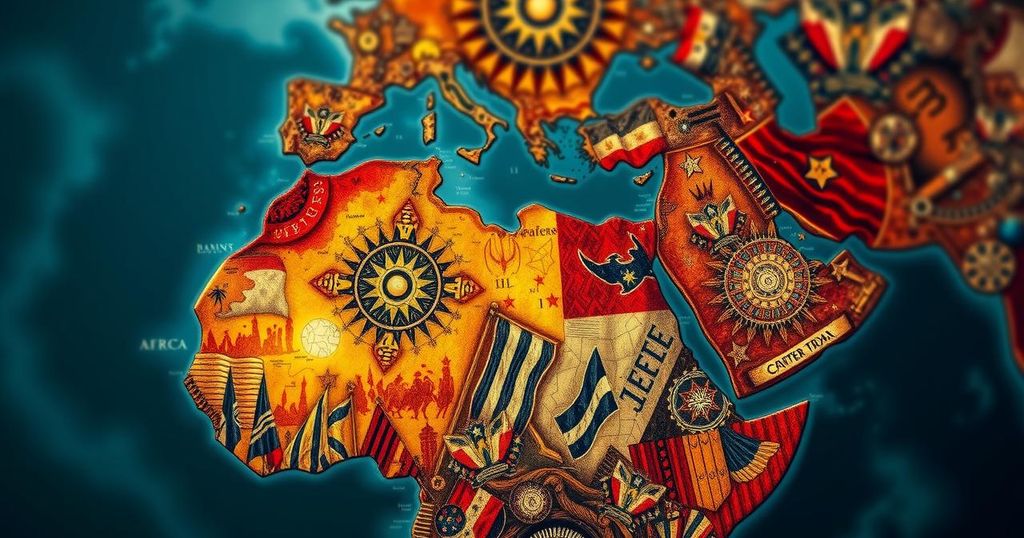Shifting Alliances Heighten Tensions in the Horn of Africa

Tensions are escalating in the Horn of Africa as Egypt, Somalia, and Eritrea pursue a potential military alliance against Ethiopia amid ongoing regional instability. A meeting on October 10, 2024, focused on collective security measures and economic sanctions demonstrates a strategic pivot that could have profound implications for the geopolitical balance in the area. Ethiopia’s agreement with Somaliland has drawn harsh criticism and contributed to the formation of this coalition, heightening fears of proxy conflicts reminiscent of the Cold War. The overall situation remains precarious, with dire consequences anticipated for regional stability.
The Horn of Africa is experiencing renewed tensions as Egypt, Somalia, and Eritrea convene to discuss a potential military alliance targeting Ethiopia. This pivotal meeting, held on October 10, 2024, in Asmara, is indicative of a significant diplomatic shift, with the involved nations contemplating collective security measures and possible economic sanctions against Ethiopia. The backdrop is fraught with regional instability, notably driven by the devastating civil war in Ethiopia that has resulted in an alarming loss of life and significant regional displacement. The meeting marks the first collective effort of Eritrean President Isaias Afwerki, Egyptian President Abdel Fattah al-Sisi, and Somali President Hassan Sheikh Mohamud towards an anti-Ethiopian coalition, exacerbated by Ethiopia’s recent agreement with Somaliland—a region that has declared independence from Somalia. This agreement grants Ethiopia access to the Red Sea through the port of Berbera, a move that Somalia regards as a breach of its territorial integrity. Egypt’s strategy appears to encompass encircling Ethiopia amid longstanding tensions over the Grand Ethiopian Renaissance Dam, which Cairo perceives as a direct threat to its water security. The repercussions of the Ethiopia-Somaliland deal have prompted Egypt and Eritrea to seek a united front against Ethiopia, with security cooperation agreements taking shape among them. However, while this alliance could offer security to the involved countries, it raises questions about the tangible benefits for Somalia and Eritrea, particularly regarding the ongoing instability in Somalia driven by the extremist group Al Shabab, which is collaborating with external militants to strengthen its position. Furthermore, Eritrea remains under significant international isolation and sanctions, which complicates its regional engagements. The potential collapse of ongoing agreements, like the Algiers Agreement, could foster greater conflict. Despite these escalating tensions, the international community appears largely oblivious to the brewing crises in this volatile region. An emergent theme seems to suggest that the Horn of Africa is on an unpredictable trajectory, potentially signaling the onset of proxy conflicts mirroring historical Cold War dynamics.
In recent years, the Horn of Africa has become a focal point of geopolitical tension, primarily due to Ethiopia’s internal strife and its contentious relationships with neighboring countries. The deepening civil war within Ethiopia not only poses a humanitarian crisis with staggering casualties but has also led to significant refugee flows and destabilization across borders. Additionally, the apt emergence of Somaliland’s independence bid and its implications for Ethiopian access to maritime routes has drawn critical scrutiny from regional powers, notably Egypt and Eritrea, who harbor their own historical grievances against Ethiopia, particularly regarding water security and territorial claims. These multifaceted tensions have paved the way for potential military alliances, exacerbating fears of escalating conflicts akin to Cold War-era proxy wars, thereby necessitating urgent engagement from global stakeholders to avert deeper instabilities in the region.
The burgeoning alliance among Egypt, Somalia, and Eritrea represents a critical evolution in the Horn of Africa’s geopolitical landscape that may further escalate into direct confrontations with Ethiopia. As regional tensions rise over security and territorial disputes, the ramifications of these alliances could challenge the stability not only within East Africa but also in the strategic maritime domains of the Red Sea. Continued neglect of this complex situation by the international community risks worsening the humanitarian crises already afflicting millions in the region. Proactive engagement and a keen awareness of the underlying dynamics at play are essential to prevent an escalation into conflict.
Original Source: www.orfonline.org








